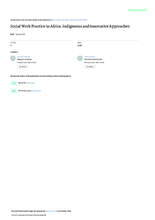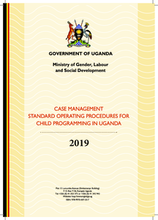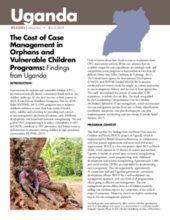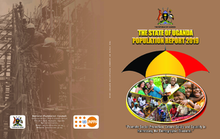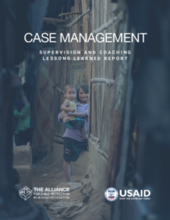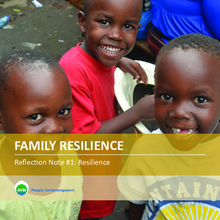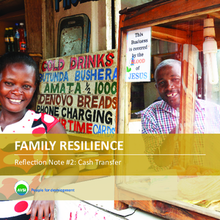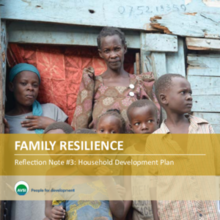This country page features an interactive, icon-based data dashboard providing a national-level overview of the status of children’s care and care reform efforts (a “Country Care Snapshot”), along with a list of resources and organizations in the country.
demographic_data
childrens_living_arrangement
children_living_without_bio
social_work_force
key_stakeholders
Key Stakeholders
Add New DataOther Relevant Reforms
Add New Datadrivers_of_institutionalisation
Drivers of Institutionaliziation
Add New Datakey_research_and_information
Key Data Sources
Add New DataThe Children Act (Uganda)
Country Care Review: Uganda
Prevalence and number of children living in institutional care: global, regional, and country estimates
The National Integrated Early Childhood Development Policy Action Plan (2016-2021) of Uganda
Catholic Care for Children in Uganda: A Family for Every Child - Findings from a Midterm Evaluation
Acknowledgements
Data for this country care snapshot was contributed by a consultant with the Data for Impact (D4I) Project at Palladium Group LLC.
Displaying 141 - 150 of 418
This book, based on empirical research, presents a selection of indigenous and innovative models and approaches of problem solving that will inspire social work practice and education.
This harmonised Case Management (CM) toolkit includes standard operating procedures describing how each step of the CM process should be implemented, tools or forms that should be used for CM, and additional guidance that must be taken into account by actors involved in CM.
USAID and PEPFAR-funded MEASURE Evaluation worked with six OVC projects in six countries to gain insight on current approaches to OVC case management, map how costs can be linked to OVC case management activities, and determine the cost of OVC case management.
This brief outlines the findings from the Better Outcomes for Children and Youth project, in Uganda
The State of Uganda Population Report 2019 shows the potential of social protection systems to promote inclusive development that leaves no one behind—to reduce poverty, inequality and promote social inclusion.
The Case Management Task Force (CMTF) of the Alliance for Child Protection in Humanitarian Action commissioned this project to gather and draft key lessons learned on the Case Management Supervision and Coaching initiative. Key questions that the Task Force wanted to address included feedback on the interagency country collaboration, the effectiveness of the localization approach, the successes and challenges of roll-outs in the eight participating countries, and the impact on case management teams’ supervision practices.
This Reflection Note is intended as a means for AVSI staff and implementing partners on the FARE project to capture emerging learning as relates to the theory of change elaborated during project design.
This Reflection Note is intended as a means for AVSI staff and implementing partners on the FARE project to capture emerging learning as relates to the theory of change elaborated during project design. Particularly, the Reflection Note seeks to answer how necessary and effective cash transfers are as a component of the economic strengthening pathway, hypothesized as crucial for the project goals of building family resilience as a means of preventing child-family separation or ensuring successful reintegration of children into family care.
This Reflection Note from the Family Resilience (FARE) project asked how, in practice, Household Development Plans were used, and what was their value in improving the relationship environment and capacities of families to reintegrate previously separated children and youth back at home and to prevent separation.
The primary goal of the ASPIRES project is to support gender-sensitive programming, research and learning to improve the economic security of highly vulnerable individuals, families and children.

